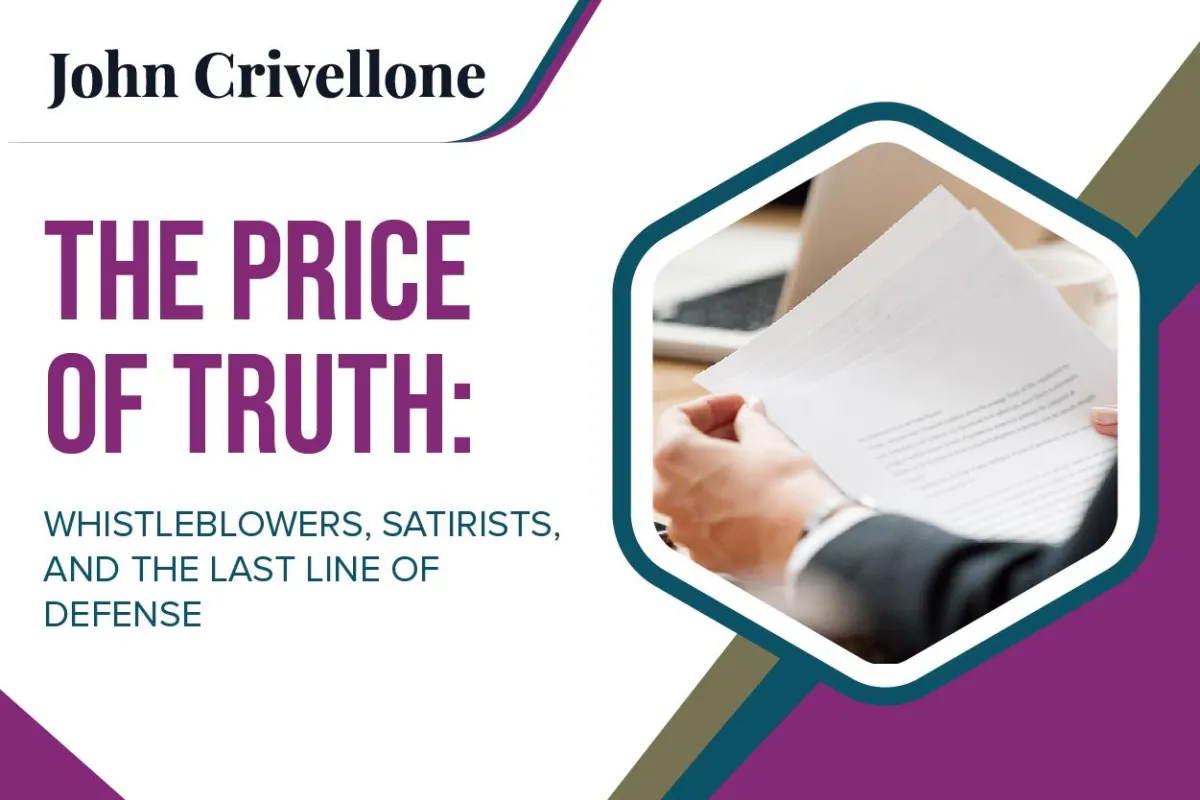
The Price of Truth: Whistleblowers, Satirists, and the Last Line of Defense
Freedom doesn’t disappear in a blinding flash of tyranny—it dies quietly, strangled by silence. And in today’s world, the loudest voices for truth aren’t coming from elected officials or so-called watchdog institutions. They’re coming from comedians, whistleblowers, and social critics who dare to call out the farce we’re living in. If you're not paying attention, you might think it's just entertainment. But satire, leaks, and dark humor have become the last weapons of the people.
This blog—the sixth in our truth-bomb series based on my book Big Brother Is Watching —dives into the unsettling shift in truth-telling: where the court jesters now speak more truth than the kings, and the brave are branded as threats.
A Time When Truth Was a Profession
There was a time when journalism was a noble craft. Investigative reporters were the frontline defenders of democracy. They broke Watergate. They exposed corporate fraud. They challenged the war machine. Now? Now they’re parroting talking points, reading from teleprompters, or shilling pharmaceutical ads between segments on "wellness."
The fourth estate has been bought. Consolidated. Choked. Five conglomerates control 90% of U.S. media. It’s not a conspiracy—it’s a balance sheet. And when the press becomes a PR machine, who’s left to speak the truth?
Enter the unlikely heroes: the comic, the whistleblower, and the meme-maker.
The Comedian as Prophet
George Carlin wasn’t just funny—he was prophetic. When he said, "It's a big club, and you ain't in it," people laughed. But they also nodded. Comedians like Carlin, Dave Chappelle, Jon Stewart, Bill Hicks—they didn’t just tell jokes. They held up mirrors. They weaponized absurdity against injustice. They still do.
Why comedians? Because satire slips past the guards. Because laughter disarms, then enlightens. Because you can only speak hard truths if you wrap them in punchlines. The court jester could mock the king when no one else dared. Today, it’s no different.
But make no mistake—today’s jesters are under fire. De-platformed. Censored. Labeled dangerous. Not because they’re wrong, but because they’re right, and they’re reaching people.
Whistleblowers: Patriots or Traitors?
Whistleblowers used to be seen as heroes. Now they’re fugitives.
Edward Snowden exposed illegal NSA spying. He lives in exile.
Chelsea Manning revealed war crimes. She was imprisoned.
Julian Assange published leaked truths. He’s been hunted and vilified.
Ask yourself: Why do people who expose crimes face more punishment than those who commit them?
These aren’t criminals. They’re canaries in the coal mine. And every time one of them gets silenced, our democracy suffocates a little more. If revealing the truth is treason, then maybe we need to question who the real traitors are.
Algorithms of Suppression
It used to be that censorship was blunt—book burnings, arrests, bans. Now it’s algorithmic.
Your reach is throttled.
Your posts get shadow-banned.
Your ideas are labeled "misinformation" before they’re even proven or disproven.
It’s clean. Bloodless. And far more dangerous.
Because if people don’t know they’re being silenced, they don’t resist.
Memes: The New Pamphlets of Rebellion
Don’t underestimate the meme. In 1776, we had Common Sense. In 2024, we have Elon Musk memes and Joe Rogan soundbites. It sounds absurd—until you realize memes have reach, speed, and subversion on their side.
They bypass fact-checkers. They jump firewalls. They spark thought in the scroll-addicted minds of millions. In a world drowning in noise, a perfectly timed meme can do more than a press conference ever could.
And guess what? That’s why they’re feared. Laughed at on the surface, but monitored behind the curtain.
The Danger of Delegitimizing Dissent
Here’s what the system has learned: You don’t need to jail everyone. You just need to make them seem crazy.
Call the whistleblower a "threat."
Call the comedian "offensive."
Call the activist "extreme."
Once the public dismisses them, the powers that be don’t need to lift a finger.
But history tells a different story:
Galileo was called heretical.
Martin Luther King Jr. was labeled an agitator.
Edward R. Murrow was told to tone it down.
Truth tellers rarely get applause in their own time. But without them, we have no future.
What You Can Do
Support Independent Voices: Subscribe to independent journalists. Watch real satire. Share whistleblower testimonies.
Speak Up: You don’t need a stage to tell the truth. Conversations around the dinner table change minds.
Protect Free Speech: Even when it offends you. Especially when it offends you. That’s how we keep the marketplace of ideas alive.
Remember Who Benefits from Silence: If someone is working this hard to shut someone up, maybe it’s because they’re saying something important.
Final Word: In a Time of Universal Deceit...
George Orwell said it best: "In a time of universal deceit, telling the truth is a revolutionary act."
Today, revolution wears many faces: the comic with a mic, the whistleblower with a thumb drive, the meme-maker with a cracked iPhone.
They are mocked, banned, and hunted—because they are dangerous to the lie.
And that means they’re dangerous in the best way.
This is Jack Crivalle. Still laughing. Still leaking. Still watching the watchers.
Next Blog: "Digital Redlining: How the Internet Became a Weapon of Division"
All blogs are adapted from themes in Jack Crivalle’s book, Big Brother Is Watching.